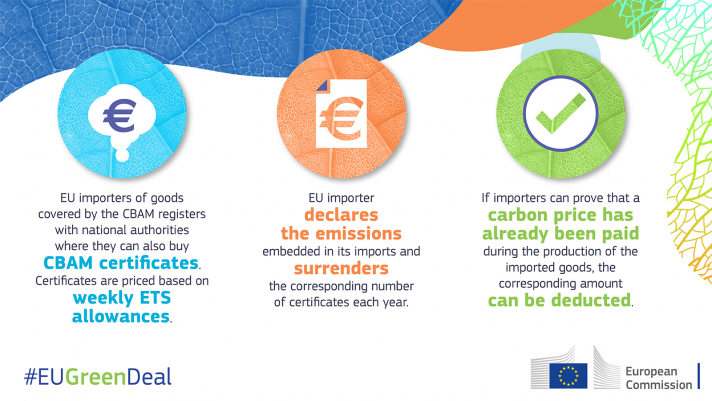Local Carbon Emission Regulations & Policies Have Global Impacts
Remember the saying “Think global, act local?” Syntax errors aside, this mantra appears to be influencing policymakers around the world who are implementing carbon emission regulations to encourage companies to reduce their carbon footprints.
Although these new decarbonization and disclosure policies are local, they have global impacts. The EU’s Carbon Border Adjustment Mechanism (CBAM) and California’s recent Climate Corporate Data Accountability Act are just two recent examples of localized policies that will affect companies far beyond their respective legislative jurisdictions.
The EU’s Carbon Border Adjustment Mechanism
The European Commission is working on reducing the carbon footprint of industrial materials such as cement, aluminum, and steel. But regulating the carbon footprint of materials manufactured in the EU runs the risk that manufacturers will move production outside the EU, geographically relocating the carbon emissions but not reducing them (what is known as “carbon leakage”).
So, the European Commission created the Carbon Border Adjustment Mechanism (CBAM), a carbon emission regulation that pressures companies at a global level to shift to more sustainable production.
CBAM Doesn’t Just Affect EU Companies
CBAM’s goal is to “put a fair price on the carbon emitted during the production of carbon-intensive goods that are entering the EU, and to encourage cleaner industrial production in non-EU countries.” CBAM will initially focus on carbon-intensive goods such as cement, iron and steel, aluminum, fertilizers, electricity, and hydrogen. The regulation will require both EU-based companies as well as any company importing these goods into the EU to report the GHG emissions (direct and indirect) embedded in the products. EU importers of relevant goods must register with national authorities where they can buy CBAM certificates (priced based on weekly ETS allowances[1]). The importer then reports the emissions embedded in its imported goods and submits a corresponding amount of CBAM certificates annually. The image below from the European Commission provides a succinct explanation of the program.

The key point here is that CBAM will affect any manufacturer of these products currently selling or hoping to sell to European markets – regardless of where the manufacturer is located. CBAM becomes fully enforceable on January 1, 2026, which gives manufacturers a relatively short runway to mitigate their carbon intensity or face financial penalties for noncompliance. For companies wishing to do business in the EU, evaluating clean power options for their energy-intensive operations will become a necessity.
California’s Climate Corporate Data Accountability Act
California’s landmark SB253 (the Climate Corporate Data Accountability Act, or CCDAA) is another example of a local regulation that will affect companies globally. The state law requires public and private companies with over $1B in revenue doing business in California to disclose their scope 1, 2, and 3 emissions (starting in 2026).
As with CBAM, the key point here is that any company with more than $1B in annual revenue that operates in California (even if headquartered elsewhere) will have to report both direct and indirect emissions. (Estimates project that the new law will impact approximately 5,300 companies.) If you are a large company doing business in California, you need to get smart about reporting mechanisms – and you probably also want to evaluate ways to reduce your emissions.
Plan Ahead for More Carbon Emission Regulations
Although local carbon emission regulations may use different enforcement mechanisms – such as financial penalties or disclosure requirements – the broad goal is the same: to require companies to track their GHG emissions (Scope 1, 2, and 3) and evaluate ways to reduce them. Both CBAM and the CCDAA demonstrate the far-reaching impact locally enacted policies will have on companies with global operations.
Organizations that want to continue to do business globally need to plan for increasing carbon disclosure and tariff policies by acting now to reduce their emissions. Clean power procurement will play a big role in decarbonization, particularly for electricity-intensive industries like aluminum and cement production. Contact us at hello@verse.inc to learn more about how to build the optimal future-proofed clean power portfolio for your business.
[1] From Eurostat: “An emissions trading system, also known as emissions trading scheme and abbreviated as ETS, is a market mechanism that allows those bodies (such as countries, companies or manufacturing plants) which emit (release) greenhouse gases into the atmosphere, to buy and sell these emissions (as permits or allowances) amongst themselves.”
IMPORTANT NOTICE: This page is provided for general informational purposes only and does not constitute individualized advice or a recommendation tailored to your specific circumstances. Verse provides analytics software. The platform provides generalized models, scenarios, and reporting for educational and informational purposes. Verse is not acting and does not claim to act as an advisor to any counterparty, customer, or user of this website and expressly disclaims any fiduciary relationship or similar obligation to act on behalf of or in the best interest of any such counterparty, customer, or user of this website. In addition, Verse is not registered with the U.S. Commodity Futures Trading Commission as a commodity trading advisor in order to provide advice regarding the value or advisability of trading in swaps, futures, options, or other regulated derivatives products. Past or simulated performance is not necessarily indicative of future results. You should consult your own independent legal, accounting, and other professional advisors prior to engaging in any transactions or services described on this website.

